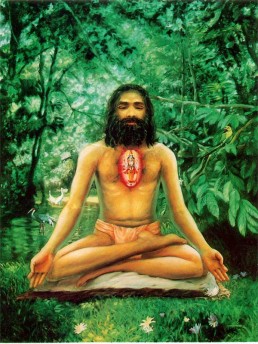Swami Chinmayananda
Swami Chinmayananda Commentary
True meditators, well-established in their intellectual understanding and spiritual experience, intuitively recognise the Divine Presence immanent in everything. Such Men of Perfection see in all activities the glory of the Self and understand their own bodily functions as nothing but the Grace of the Self. For them, there is no experience but of the Divine. Everything experienced in the gross world outside, and in the subtle realm within, is nothing but an emanation from the Eternal Self.
The highest Yogi, according to the Geeta, is one who feels the pains and joys of others as intimately as if they were his own. The famous ethical rule: “Do unto others as you would have them do unto you” is a most unpleasant instruction to the average man, because, in his selfishness, he is easily tempted to ask why he should consider others as himself. The uninitiated, in his instinctive selfishness, would naturally be tempted to follow the unethical ways of life.
The previous few stanzas explained why one should love one’s neighbours. The Yogi, after his experience of the Self, comes to recognise the whole world as nothing but himself. As all the limbs and parts of one’s body are equally dear to an individual, one can easily experience one’s intimate identity with all the different parts of the body. If your tongue were to be accidentally bitten by your own teeth, you would never think of punishing the teeth for the crime they had done, for, both IN the tongue and IN the teeth you pervade equally. Having realised the Self, when I come to feel everywhere the presence of Me as the Self, the whole Universe of names and forms becomes for Me the one integrated form, in which at all places and at all times, “I alone AM.”
Such an individual, who has in his realisation come to feel the entire universe as his own form, is called a true Yogi by the Singer of this Celestial Song. In short, a Seer of Self-realisation instinctively becomes a divinely compassionate man, producing in society more than what he consumes, and creating in the community much more than what he destroys during his lifetime. Love is his very breath, kindness his very sustenance.
In thus concluding the description of a perfect Yogi, with a word-picture of the perfect man’s attitude to life, and his relationship with the world outside, Krishna would fascinate any eagerly listening student; but Arjuna, a practical man-of-the-world, immediately discovers his incapacity to attain the goal pointed out here, and raises his own doubts, in the form of a question.
SEEING THAT THE YOGA DESCRIBED — THE YOGA OF RIGHT KNOWLEDGE — IS VERY DIFFICULT TO ATTAIN, ARJUNA WISHES TO KNOW THE SUREST MEANS OF GAINING THIS YOGA.
Adi Sankara Commentary
Atma-aupamyena: Atma means the self, i.e. oneself. That by which a comparison is made is an upama. The abstract from of that is aupamya. Atma-aupamya means a standard as would be applicable to oneself. O Arjuna, yah, he who; pasyati, judges; sarvatra, in all beings; samam, by the same standard, in the same manner; atma-aupamyena, as he would apply to himself-. And what does he view with sameness? That is being stated: As sukham, happiness, is dear to me, so also is happiness agreeable to all creatures. Va, and-the word va is (used) in the sense of and; just as yadi, whatever; duhkham, sorrow is unfavourable, unwelcome to me, so also is sorrow unwelcome and unfavourable to all creatures. In this way, he looks upon happiness and sorrow as pleasant and unpleasant to all bengs, by the same standard as he would apply to himself. He does not act against anyone. That is , he is non-injurious. He who is thus non-injurious and steadfast in full Illumination, sah, that yogi; paramah matah, is considered as the best among all the yogis. Noticing that his Yoga-as spoken of and consisting in full Illumination- is hard to acquire, Arjuna, with a view to hearing the sure means to its attainment, said:
The Bhagavad Gita with the commentary of Sri Sankaracharya – Translated by Alladi Mahadeva Sastry
Holy Geeta – Commentary by Swami Chinmayananda
The Bhagavad Gita by Eknath Easwaran – Best selling translation of the Bhagavad Gita
The Bhagavad Gita – Translation and Commentary by Swami Sivananda
Bhagavad Gita – Translation and Commentary by Bhaktivedanta Swami Prabupadha
Srimad Bhagavad Gita Chapter 6 – Verse 32 – 6.32 atmaupamyena sarvatra – All Bhagavad Gita (Geeta) Verses in Sanskrit, English, Transliteration, Word Meaning, Translation, Audio, Shankara Bhashya, Adi Sankaracharya Commentary and Links to Videos by Swami Chinmayananda and others – 6-32

